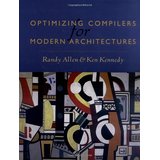Optimizing Compilers for Modern Architectures: A Dependence-Based Approach
1. Introduction
"Optimizing Compilers for Modern Architectures: A Dependence-Based Approach" by Randy Allen and Ken Kennedy is a seminal work in the field of compiler optimization. This book delves into the critical role of data dependence analysis in achieving high performance on modern computer architectures.
2. Key Concepts
- Data Dependence Analysis:
- Foundation of Optimization: Data dependence analysis is the cornerstone of many compiler optimizations. It determines the order in which instructions must execute to preserve the correctness of the program.
- Types of Dependencies:
- Data Dependence: An instruction depends on another instruction if it uses the result of the other instruction.
- True Dependence (Read After Write): An instruction reads a location after another instruction writes to it.
- Anti-dependence (Write After Read): An instruction writes to a location before another instruction reads from it.
- Output Dependence (Write After Write): Two instructions write to the same location.
- Data Dependence: An instruction depends on another instruction if it uses the result of the other instruction.
- Dependence Graphs: Visual representations of the dependencies between instructions, which are essential for many optimization techniques.
- Exploiting Parallelism:
- Instruction-Level Parallelism (ILP): Techniques like instruction pipelining, out-of-order execution, and speculative execution exploit ILP to improve performance.
- Data Parallelism: Identifying and exploiting parallelism across data elements, such as in vector and SIMD instructions.
- Loop-Level Parallelism: Techniques like loop unrolling and loop interchange to parallelize loops.
- Memory Hierarchy Optimization:
- Cache Optimization: Techniques to improve cache utilization by minimizing cache misses, such as loop tiling and data prefetching.
- Memory Access Patterns: Analyzing and optimizing memory access patterns to improve data locality and reduce memory latency.
- Modern Architectural Considerations:
- Superscalar Processors: Optimizing for processors with multiple execution units.
- Vector Processors: Generating efficient code for SIMD instructions.
- Multi-core Processors: Exploiting parallelism across multiple cores.
- GPU Computing: Generating code for GPUs, which have a massively parallel architecture.
3. Significance and Impact
- High-Performance Computing: Dependence analysis and optimization techniques are crucial for achieving high performance on modern computer architectures, enabling breakthroughs in scientific computing, machine learning, and other demanding applications.
- Compiler Design: This book has significantly influenced the design and implementation of modern optimizing compilers, shaping the field of compiler research and development.
- Impact on Software Development: The advancements in compiler technology enabled by this research have had a profound impact on software development, enabling developers to write more efficient and performant code.
4. References
- "Optimizing Compilers for Modern Architectures: A Dependence-Based Approach" by Randy Allen and Ken Kennedy
- "Compilers: Principles, Techniques, and Tools" by Alfred V. Aho, Monica S. Lam, Ravi Sethi, and Jeffrey D. Ullman
- "The Dragon Book" (commonly referred to as "Compilers: Principles, Techniques, and Tools")
- ACM Digital Library: https://ieeexplore.ieee.org/
Disclaimer: This white paper provides a general overview of the key concepts and contributions of "Optimizing Compilers for Modern Architectures: A Dependence-Based Approach." The specific content and depth of coverage may vary.
Conclusion
"Optimizing Compilers for Modern Architectures: A Dependence-Based Approach" is a seminal work that has significantly impacted the field of compiler design. By focusing on data dependence analysis and its application to modern architectures, the book has provided valuable insights into achieving high performance and unlocking the full potential of modern computing systems.



